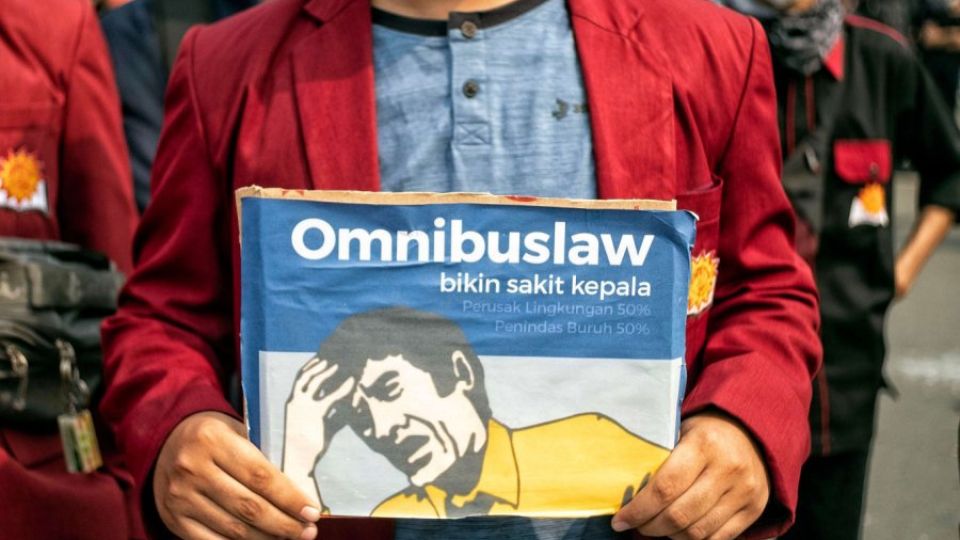February 17, 2023
JAKARTA – Labor unions and worker rights activists plan to stage another nationwide protest and strikes to oppose the controversial government regulation in lieu of law (Perppu) on job creation that is set to be passed into law in a House of Representatives plenary session in March.
Confederation of Indonesian Trade Unions (KSPI) chairman Said Iqbal on Thursday expressed his dismay that lawmakers of the House Legislation Body (Baleg) have endorsed the Perppu, saying that 5 million workers would take part in mass rallies and strikes in various cities.
“We are preparing for large-scale protests that will begin at the end of February across 34 provinces. If this gets ignored, labor unions will consider holding a nationwide strike,” Said Iqbal told a press briefing on Thursday.
The House is planning to pass the Perppu in a plenary meeting in March after the 1,117-page document secured majority support from Baleg at the end of a two-day meeting between lawmakers and the government on Wednesday evening, with all pro-government parties firmly supporting the government’s decision from the get-go.
It was signed by President Joko “Jokowi” Widodo in December 2022 to resuscitate the also controversial Jobs Law, which was declared “conditionally unconstitutional” by the Constitutional Court in 2021 because it used the unrecognized omnibus method to revise multiple laws at once and was deliberated with minimal public participation. The court ordered the government and the House to redo the law-making process within two years or it would be permanently revoked. Instead, the government issued the Perppu after it cut corners with lawmakers by enacting another law that allows the use of omnibus methods.
The Perppu however must be passed by a House plenary session after it was signed by the President to become permanent legislation.
The 1,117-page policy secured majority support from Baleg at the end of a two-day meeting between lawmakers and the government on Wednesday evening, with all pro-government parties firmly supporting the government’s decision from the start.
“On Tuesday, we have a plenary session to close this sitting period. Then, we are going to recess until March. Maybe in the first week after recess, when everything is ready, [the Perppu] will be brought to the plenary session,” said Baleg deputy chairman M Nurdin, as quoted by Kompas daily.
The government has said the Perppu was to meet “the urgent need to anticipate the global economic crisis and global recession, as well as the need to avert the repercussions of increased inflation and the threat of stagflation”.
But civil groups accused the government of bypassing proper debate in the legislature when issuing the Perppu. Aside from how the Perppu seemed to come out of the blue, they have also zeroed in on provisions they deem unfavorable to workers’ interests.
Joining critics were two opposition parties in the House, the Democratic Party and the Prosperous Justice Party (PKS), which, in early January not long after Jokowi signed the Perppu, said that the issuance process was a “constitutional disaster”.
Coordinating Economic Minister Airlangga Hartarto, who attended the Wednesday meeting representing the government, dismissed accusations that the deliberation on the Perppu was rushed, saying that there was a time limit in the discussion and it needed to be done in one House sitting period.
“There’s no such thing as being rushed. The President sent a letter [asking for House’s approval] in early January. The deliberation must be in one sitting period. There is a time limit,” Airlangga told reporters.
Airlangga also gave reassurance over the legal certainty of the Perppu, saying that the policymakers had followed the court’s ruling.
A group of university students, activists and some labor groups are currently challenging the Perppu at the Constitutional Court.
KSPI’s Said Iqbal, who is also the chairman of the Labor Party, a newcomer party in the 2024 legislative election, also considered launching an international campaign to pressure the House to not pass the Perppu. He said other countries might see the Perppu as a precedent to make regulations that hurt labor rights.
“As a deputy member of the International Labor Organization’s [ILO] governing body, I will visit their headquarters in Geneva in March asking for their support to launch campaigns against the Indonesian government considering the danger the Perppu can pose to workers internationally.”


